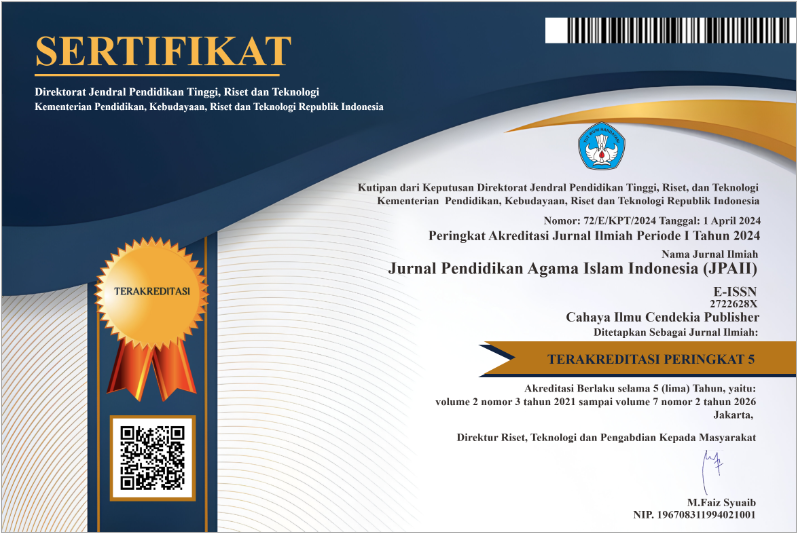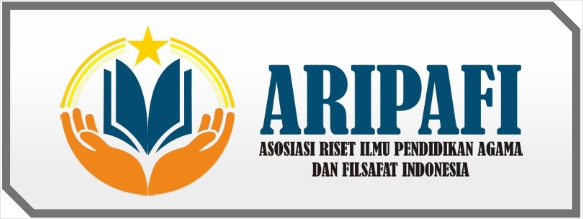Tambourine Art as a Da'wah Strategy in the Actualization of Islamic Values in Islamic Religious Education Learning
Abstract
Purpose of the study: The purpose of this research is to determine the art of tambourine as a da'wah strategy in the actualization of Islamic values in Islamic religious education learning.
Methodology: This research uses a qualitative approach with a case study method. The instrument used in data collection was an interview sheet. This research data analysis will use a qualitative data analysis approach by Miles and Huberman which includes data collection, data reduction, data presentation, and drawing conclusions.
Main Findings: The results of this research are the integration of local wisdom values, especially through Tambourine Art, in Islamic Religious Education learning which has a positive impact in strengthening students' understanding of local religious and cultural values. Learning that is contextual and relevant to students' lives can make a significant contribution to the formation of strong character rooted in noble religious values.
Novelty/Originality of this study: The use of Tambourine Art as a Da'wah Strategy in Islamic Religious Education learning provides a holistic learning approach, combining aspects of art, culture and religion in one container. This can enrich students' learning experience and help them to better understand Islamic teachings as a whole.
References
Z. Mustafa, B. Nordin, and N. Yusuf, "Da’wah Transformation Method In The New Millenium", Gading Journal for Social Sciences, vol. 21, no. 2, pp., 27-36, 2018.
R. Rodiana, and I. Rosidi, "Da'wah and Social Change in Islamic Organizations: Muhammadiyah and Its Elements", Asyahid Journal of Islamic and Quranic Studies (AJIQS), vol. 4, no. 1, pp. 80-100, 2022.
W. Wirmanhanizon, R. Mulyani, and P. R. Putri, "Implementation of Da’wah Methods in Islamic Education Learning", Ahlussunnah: Journal of Islamic Education, vol. 2, no. 3, pp. 91-96, 2023, doi: 10.58485/jie.v2i3.193
M. Haramain, and S. Aminah, "Peaceful Da’wah and Religious Conflicts in Contemporary Indonesia", KURIOSITAS: Media Komunikasi Sosial Dan Keagamaan, vol. 14, no. 2, pp. 208-223, 2021.
S. S. Karimullah, N. M. Said, W. Wasalmi, and A. G. Syafi’i, "Da'wah for Social Justice: Creating Awareness of Social Issues Through a Religious Approach", Jurnal Dakwah Risalah, vol. 34, no. 2, pp. 110-128, 2023.
R. Rosidi, M. Mubasit, and A. Q. Zaelani, "Ethics of Da'wah Communication Through Social Media During the COVID-19 Pandemic in Indonesia", Al-Tahrir: Jurnal Pemikiran Islam, vol. 22, no. 2, pp. 233-250, 2022, doi: 10.21154/altahrir.v22i2.3678
A. Arianto, "Analysis of Da'i Communication Skills towards the Muslim Converted Karomba Community", Al-Balagh: Jurnal Dakwah Dan Komunikasi, vol. 6, no. 1, pp. 35-66, 2021, doi: 10.22515/al-balagh.v6i1.3019
M. F. M. Sharif, and R. Shamsudin, "Intercultural Da’wah Taxonomy for a Pluralist Society", KATHA-The Official Journal of the Centre for Civilisational Dialogue, vol. 13, no. 1, pp. 94-117, 2017, doi: 10.22452/KATHA.vol13no1.5
S. Dida, E. Lusiana, "Health Communication Pattern of Thibbun Nabawi Prophetic Medicine Adjust to Indonesian Culture", Review of International Geographical Education Online, vol. 11, no. 5, pp. 1-11, 2021.
G. D. Natarina, "Practice Communication Through Music", American Journal of Universal Studies, vol. 1, no. 1, pp. 28-33, 2023.
Z. Trinova, "Implementation of islamic character based education in student’religious extracurricular activities", Jurnal Penelitian, vol. 7, no. 1, 2020.
I. Y. F. Bansu, N. S. Elmanaya, M. G. I. ElBasiouny, and S. Shobron, "Religious Values and Multiculturalism in the Sayyang Pattu'du Tradition in West Sulawesi Indonesia", Solo Universal Journal of Islamic Education and Multiculturalism, vol. 1, no. 2, pp. 104-117, 2023,doi: doi.org/10.61455/sujiem.v1i02.46
R. Kershaw, "Flying the just flag of Islam: Anti-Western and anti-Jewish themes in some Brunei fatwas", RIMA: Review of Indonesian and Malaysian Affairs, vol. 45, no. 1, pp. 165-197, 2011, doi: 10.3316/ielapa.422790360053568
T. G. Foltz, "Drumming and re-enchantment: Creating spiritual community", In Popular Spiritualities pp. 131-143, Routledge, 2018.
J. Boyce-Tillman, "Liberating language and concepts of the divine in contemporary hymnody", Verbum et Ecclesia, vol. 38, no. 2, pp. 1-9, 2017.
B. Afrianto, "Marhaban As A Form Of Qasidah Music Continuity In The City Of Binjai, Northern Sumatra Province", In Talenta Conference Series: Local Wisdom, Social, and Arts (LWSA), vol. 3, no. 4, pp. 8-10, 2020.
A. B. E. Ali, T. Al-Mutawakkil, N. Fadli, and A. A. Adzim, "Sharia Views on Music and Songs: Perspective Study of Muhammadiyah and Madzhab Four", Demak Universal Journal of Islam and Sharia, vol. 1, no. 1, pp. 10-17, 2023.
I. Y. F. Bansu, N. S. Elmanaya, M. G. I. ElBasiouny, and S. Shobron, "Religious Values and Multiculturalism in the Sayyang Pattu'du Tradition in West Sulawesi Indonesia", Solo Universal Journal of Islamic Education and Multiculturalism, vol. 1, no. 2, pp. 104-117, 2023.
M. Sobirin, "Negotiating Tradition and Innovation Upon the Cross-Generational Art of Singiran (Improvisation, Cultural Identity and Millennial Community)", Teosofia: Indonesian Journal of Islamic Mysticism, vol. 8, no. 1, pp. 69-80, 2020.
B. Bolong, B. "Islam and local culture in Timor" Indonesian Journal of Interdisciplinary Islamic Studies (IJIIS), pp. 57-83, 2020.
M. Rodliyatun, and B. Zaman, "Sekatenan Tradition as a Form of Community Integration in the Viewpoint of Phenomenology and Sociology of Religion", WARAQAT: Jurnal Ilmu-Ilmu Keislaman, vol. 7, no. 2, pp. 208-219, 2022.
E. Rahmawati, and H. Putranta, "The exploration of local wisdom values of performing arts: An art of Kuda Lumping Sarimpi", Humanities & Social Sciences Reviews, vol. 8, no. 5, pp. 307-318, 2020.
E. Kurniawati, and M. Aliman, "Participation of green environmental group and ulur-ulur local wisdom on buret lake ecotourism management in karst area of tulungagung, Indonesia", Geo Journal of Tourism and Geosites, vol. 30, pp. 889-895, 2020.
T. A. Fahrullah, A. Kosasih, Y. Rohmayani, and S. Mahdi, "The Local Wisdom of the Sundanese-People on Culture, Language, and Arabs in Sumedang District", Sosiohumaniora, vol. 24, no. 3, pp. 313-323, 2022.
K. Vyvial, "Exploring Culture, Acknowledging Stereotypes", Journal of College Academic Support Programs, vol. 4, no. 2, pp. 61-62, 2022.
S. Sauri, S. Gunara, and F. Cipta, "Establishing the identity of insan kamil generation through music learning activities in pesantren", Heliyon, vol. 8, no. 7, 2022, doi: 10.1016/j.heliyon.2022.e09958
S. Shobron, and M. N. R. Maksum, "Humanist Education the Dayak of Kalimantan Indonesia Islamic Perspective", Solo Universal Journal of Islamic Education and Multiculturalism, vol. 1, no. 1, pp. 20-29, 2023, doi: 10.61455/sujiem.v1i01.27
E. C. Chao, "‘Not Fanatical’: The Evolution of Sociable Piety and the Dialogic Subject in Multi-religious Indonesia", The Asia Pacific Journal of Anthropology, vol. 15, no. 3, pp. 242-264, 2014, doi: 10.1080/14442213.2014.913672
T. Sudjatnika, and R. Shafarini, "Model of Islamic Civilization in Indonesia", Islamic Research, vol. 5, no. 1, pp. 108-117, 2022, doi: 10.47076/jkpis.v5i1.94
I. R. Al-Faruqi, "Islamic Thought and Culture", International Institute of Islamic Thought (IIIT), 1982.
H. Simons, "Case study research: In-depth understanding in context", The Oxford handbook of qualitative research, pp. 455-470, 2014.
A. Dubois, and M. Gibbert, "From complexity to transparency: managing the interplay between theory, method and empirical phenomena in IMM case studies", Industrial marketing management, vol. 39, no. 1, pp. 129-136, 2010, doi: 10.1016/j.indmarman.2009.08.003
C. Welch, R. Piekkari, E. Plakoyiannaki, and E. Paavilainen-Mäntymäki, "Theorising from case studies: Towards a pluralist future for international business research", Journal of international business studies, vol. 42, pp. 740-762, 2011.
E. A. Mezmir, "Qualitative data analysis: An overview of data reduction, data display, and interpretation", Research on humanities and social sciences, vol. 10, no. 21, pp. 15-27, 2020
N. L. Leech, and A. J. Onwuegbuzie, "An array of qualitative data analysis tools: A call for data analysis triangulation", School psychology quarterly, vol. 22, no. 4, pp. 557, 2007.
K. B. Jang, "Layers of thought on Korean music, music education and the value of music and arts in the context of education and human development", In Educating in the Arts: The Asian Experience: Twenty-Four Essays, pp. 261-272, Dordrecht: Springer Netherlands, 2008.
M. Van de Water, M. McAvoy, and k. Hunt, "Drama and education: Performance methodologies for teaching and learning", Routledge, 2015.
M. M. Ahdad, S. Suyadi, N. Loka, E. Purnomo, and M. Mansur, "Local Wisdom Learning Strategies in Early Childhood Education (Case Study: Early Childhood Education in the Special Region of Yogyakarta and South Sumatera)", Cakrawala Dini: Jurnal Pendidikan Anak Usia Dini, vol. 14, no. 1, pp. 63-72.
H. Heriyanti, A. Jamilah, D. Pratamawati, L. M. Lu'mu, "Character Values of Children's Moral and Spiritual Education through Sayyang Pattu'du", Asian Journal of Social Science and Management Technology, vol. 2, no. 1, pp. 127-135, 2023.
A. Supriati, and M. Umar, "The role of coastal communities to preserve local wisdom (A study in community of Bunaken Island, Indonesia)", In 2nd Annual Civic Education Conference (ACEC 2019) (pp. 26-29). Atlantis Press, 2020.
M. P. W. Mukti, W. Wadiyo, and T. Triyanto, "The Value of Character Education in the Terbang Papat Music Performance (Study of the Al-Madais Pladen Jekulo Kudus Group)", Catharsis, vol. 11, no. 1, pp. 14-25, 2022, doi: 10.15294/catharsis.v11i1.56594
M. Faqih, Z. Abidin, K. Faizin, "Strengthening Religious Moderation at the Nurul Islam Antirogo Jember Islamic Boarding School", International Journal of Education, Vocational and Social Science, vol. 2, no. 3, pp. 214-228, 2023, doi: 10.99075/ijevss.v2i03.379
Copyright (c) 2023 Rahmatiah, Asna Isa

This work is licensed under a Creative Commons Attribution-NonCommercial 4.0 International License.
Authors who publish with this journal agree to the following terms:
- Authors retain copyright and acknowledge that the Jurnal Pendidikan Agama Islam Indonesia (JPAII) is the first publisher licensed under a Creative Commons Attribution 4.0 International License.
- Authors are able to enter into separate, additional contractual arrangements for the non-exclusive distribution of the journal's published version of the work (e.g., post it to an institutional repository or publish it in a book), with an acknowledgment of its initial publication in this journal.
- Authors are permitted and encouraged to post their work online (e.g., in institutional repositories or on their website) prior to and during the submission process, as it can lead to productive exchanges and earlier and greater citation of published work.






.png)
.png)





















